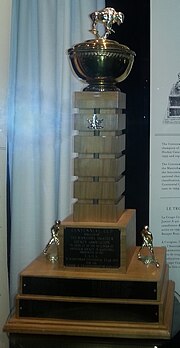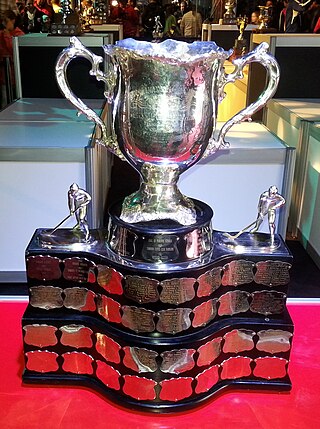Ontario Hockey Association
Ladds joined the Ontario Hockey Association (OHA) in 1975, to oversee its program for on-ice officials. [2] On July 6, 1977, he was appointed secretary-manager of the OHA to succeed David Branch. [1]
During the 1978–79 season, the OHA suspended 31 players for attacking on-ice officials. Ladds was faced with complaints from officials that the suspensions were too short, and demands for more protection since officials had no appeal process for the suspensions. Ladds felt that 31 attacks was not bad considering the number of games assigned, and noted that officials had representation on the OHA referee committee. [4]
1980 to 1989
Ladds was appointed president of the OHA on April 28, 1980, after a restructuring from an elected president into an elected chairman and an appointed president. He was to focus on the increasing business demands on the OHA, fundraising and publicity, and be a technical co-ordinator. [5] Ladds became the first paid full-time president of the OHA. [6]
In March 1982, Ladds gave a five-season suspension to a player for striking and threatening referees. It was the lengthiest suspension given within 30 years, which Ladds justified since the player was a repeat offender. [7] Later in the same month when a player was ejected from a game for fighting and threatening a referee, Ladds initially gave a suspension for the remainder of the season followed by probation for the next season. Ladds later agreed to reduce the suspension to eight games combined with time served by the player as a referee for minor ice hockey, as an experimental alternative to a lengthy suspension. [8]
When the Ontario Hockey League (OHL) split from the OHA in July 1982, Ladds felt they might compete for the same players. [9] The OHA and OHL disagreed on financial terms of affiliation, then the OHL decided to handle its own administration. [9] [10] The OHA told referees that they could not work for both organizations, which was later reversed by Ladds who felt that it was unfair for the referees. [11] Ladds and the OHL later reached an interim affiliation agreement, which allowed the OHL to compete at the Memorial Cup. [12]
In 1982, Ladds sought to increase publicity for the Northern Ontario Hockey Association (NOHA), and arranged for a feature in The Hockey News by co-ordinating contributions by its member leagues. [13] Later in the year, he oversaw establishment and publication of OHA Hockey News as a house organ. [14]

The OHA Senior A Hockey League ceased operations after the 1986–87 season, when it was reduced to three teams and the OHA was unable to find new teams. Ladds felt that the league had become cost-prohibitive, and noted the need to cut costs and restructure senior ice hockey to compete for the Allan Cup. [15]
In 1987, the Port Elgin Bears withdrew from a Western Ontario Junior C Hockey League playoffs series due to perceived on-ice violence by the Hanover Barons. Ladds and the OHA investigated the incident, which received national publicity when Port Elgin's coach was supported by Otto Jelinek, the Canadian Minister of State for Fitness and Amateur Sport. [16] Port Elgin team officials were given one-year suspensions when the OHA found no evidence to justify abandoning the series. Ladds felt that the OHA had a responsibility to enforce player safety when justified, and agreed to study controlling on-ice violence. [17] In the 1987–88 season, Ladds suspended a player for life who struck an opponent in the head with a hockey stick. [18]
During the summer in 1989, the Metro Toronto Hockey League (MTHL) and the Ontario Minor Hockey Association (OMHA), broke away from the OHA and formed the Central Canada Hockey Association, due to disagreement with an OHA restructuring proposal which would have limited their voting powers. The dispute ended when the Ontario Hockey Federation (OHF) was established, with equal representation for the OHA, NOHA, MTHL, and OMHA. Ladds was named executive director of the OHF, which was given the mandate to oversee hockey in Ontario, and be a review panel for three years to propose further restructuring if necessary. [19]
1990 to 1999
Ladds and the OHA established bursaries as of the 1995–96 season, to counter the loss of players to scholarships in the United States. The OHA awarded the bursaries to students chosen to attend the University of Windsor, University of Waterloo, and Wilfrid Laurier University. [20]
When 13 people from the Tilbury Hawks were charged with sex-related crimes in 1994, Ladds sought to eliminate hazing from the OHA and suspended the team's officials for one year. [21] In 1997, parents of players on the Kingsville Comets spoke out against hazing and campaigned for its end. Ladds felt that the OHA must educate its teams and players annually on acceptable practices, in order to prevent incidents and change future behaviour. [22] Ladds subsequently published handbooks given to players annually which covered hazing, alcohol, drug use, tobacco, and sexual harassment. He also required each team to have a youth worker serving as a prevention services co-ordinator. [23] The OHA then requested that the Canadian Amateur Hockey Association (CAHA) include the education in coaching certification programs, and for it to be available to all hockey administrators. [24]
The Metro Junior A Hockey League (MetJHL) operated independent from the OHA as of the 1995–96 season, when it was opposed to a ruling by the CAHA which gave jurisdiction over junior ice hockey in the province to the OHA. Ladds hoped to negotiate a settlement despite that several teams departed the MetJHL to join the Ontario Provincial Junior A Hockey League (OPJHL) which was affiliated with the OHA. [25] Ladds sought for the MetJHL and OPJHL to compete at an equal level within the OHA, whereas the MetJHL insisted on its own administration and was opposed to paying fees to the OHA. [26] The MetJHL rejoined the OHA in 1997, then merged into the OPJHL in 1998. [27]
Ladds wanted to establish a junior hockey league that was more provincial in nature, rather than several local leagues within Ontario. He proposed merging the two tier-2 junior A leagues, and the two junior B leagues, which included 65 teams. He felt that there was little difference in talent between the junior A and B leagues, and that more teams deserved the opportunity to compete for the Royal Bank Cup as national champions. He envisioned a provincial championship for all teams, and to market a program divided into divisions or conferences, similar to the National Collegiate Athletic Association in the United States. [27]
In the 1997–98 season, Ladds sought to reduce on-ice penalties, and planned post-season interviews with the coaches of the most penalized teams to justify their registration as a coach in future seasons. In the same season, the OHA began the practice of linesmen on the ice during warm-ups to prevent pre-game taunting and physical incidents. [28] In the 1998–99 season, Ladds decided that the length of a suspension for any player who injured another would last at least as long as the injury, "in order for him to appreciate the seriousness of his action". [29] Ladds felt that the coaches and players needed to take responsibility for their actions, and they denied the need end brawling in hockey. He stated that the suspension was a trend of lengthier punishments driven by public outcry, and that hockey administrators moved towards marketing a non-violent game. [30]
2000 to 2012
In 2000, Ladds served as chairman of the bid committee for Hamilton and Kitchener to host the 2003 World Junior Ice Hockey Championships. [31] In 2001, Ladds appointed Vern Stenlund as the OHA's first "master mentor coach", to improve the quality of coaching and the player experience in junior hockey. [32]
When the World Junior A Challenge was established in 2006, Ladds felt that it gave exposure to junior hockey and could serve as source of players for the Canada men's national junior team. [33] From 2006 to 2008, he was the director of operations for the Canada East team at the World Junior A Challenge, which won two silver medals and a bronze medal. He held the same role for Ontario's hockey teams at the Canada Games, which won gold and silver medals in consecutive events. [3]
When Major League Hockey merged with the Eastern Ontario Senior Hockey League in 2008, Ladds felt it was needed to maintain well-run OHA franchises. He hoped for senior hockey return to regenerate after the AAA-level had shrunk to only five teams. [34] Ladds stated that his most difficult experience as president was the death of Don Sanderson, who sustained an on-ice head injury while playing for the Whitby Dunlops in 2009. [2] The OHA subsequently debated its rules for wearing hockey helmets, and Ladds argued for them to be properly worn and securely fastened. [35]
Ladds led the study "Tomorrow's Game" to help OHA teams manage their finances and volunteers, which began in 2006 as a survey of teams and leagues to assess priorities and gather recommendations. [2] [36] The study also proposed restructuring junior hockey as of the 2010–11 season, which would have reclassified teams from A to D levels, into a premier league and two developmental leagues. Teams in the proposed premier league would have been required to employ a full-time coach, doctor, nutritionist, and athletic trainers. [36] Ladds felt that junior hockey in Ontario needed to be more attractive to players, who were departing the OHA for leagues elsewhere in Canada. [36]
Retirement
Ladds retired as OHA president in June 2012. He stated that when he began working for the OHA, he dealt with "three or four bench-clearing brawls [each] weekend", but that culture had changed over time. [2] He felt that the OHA had transitioned into being "a more nimble and responsive organization" than when he began; and was proud of his work to advance player safety and reduce on-ice injuries, which included increased penalties for rough play and certification programs for coaches and referees. [2]
Ladds reflected on his experience with the OHA by stating,
"I didn't know Belle River from Belleville when I first arrived. Hockey has taken me all around Ontario. If I got a flat tire, I could stop in any town in the province and get help from someone I know." [2]








